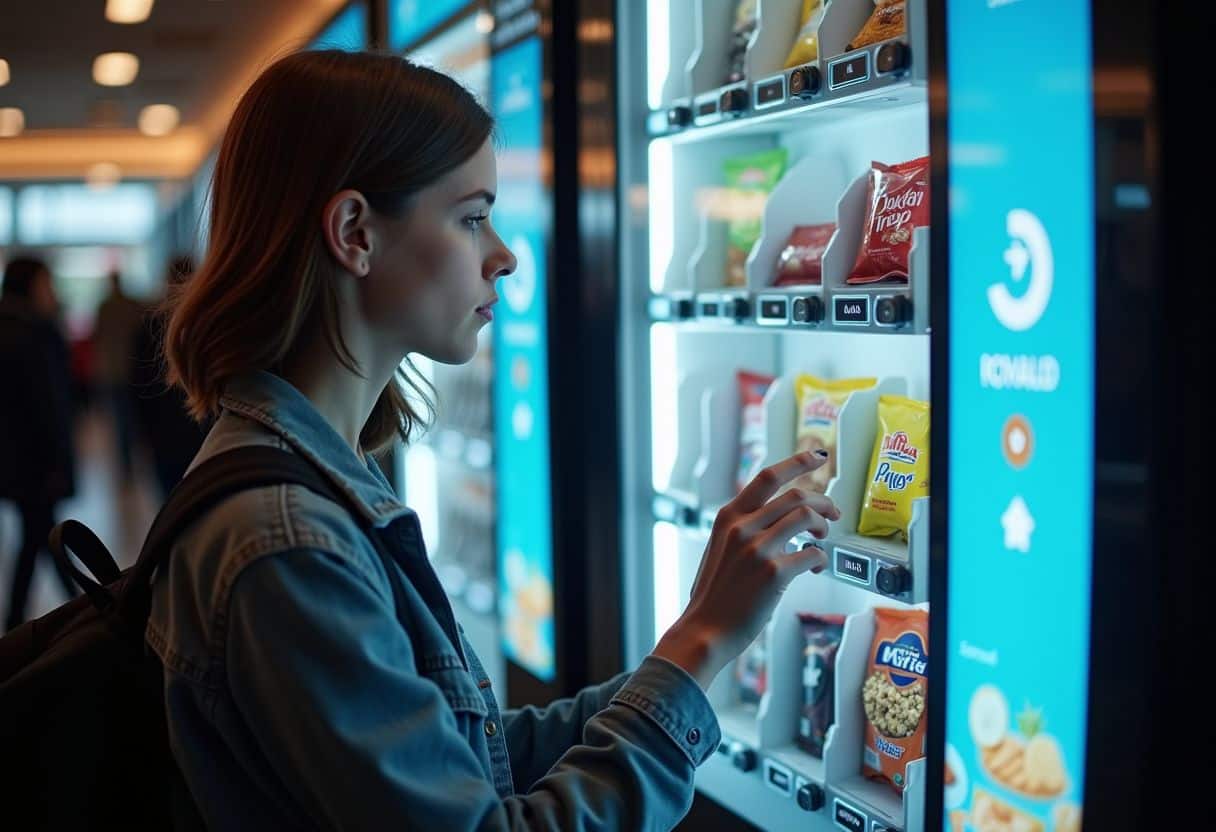Is vending technology integration phasing out old models?
Are Traditional Vending Machines on the Brink of Obsolescence?
What if the vending machines you recognize today are already artifacts of a bygone era? Imagine if the very foundations of automated retail are being transformed by advancements so significant that they render traditional models redundant. This scenario is not merely speculative—it represents the current trajectory of the vending industry, propelled by swift innovation and digital transformation. Within the next five years, coin-operated devices and limited product selections could well become historical curiosities, replaced by intelligent systems that anticipate consumer needs, enhance operational efficiency, and offer unparalleled convenience.
But how did we arrive at this juncture? The convergence of AI-driven vending solutions, IoT integration, and smart payment systems is not simply altering the industry—it is fundamentally dismantling its traditional framework. These technologies transcend mere upgrades; they signify a revolution, establishing new standards for vending machine capabilities. From predictive analytics that avert malfunctions to cashless systems that eliminate the necessity for physical currency, the future of vending is intelligence-driven, accelerated, and profoundly interconnected.
So, what implications does this hold for conventional vending models? Can they adapt to these sweeping changes, or are they destined to fade into obscurity? Join us as we explore the latest developments in vending technology and groundbreaking innovations that are expanding the horizons of what’s achievable. By the end, you will understand why the vending industry is not merely evolving—it is undergoing a profound transformation, leaving no room for outdated practices. The decline of traditional models has commenced.
AI-Driven Transformations in Vending Machines

Imagine approaching a vending machine that understands your preferences before you even make a selection. This scenario is no longer the stuff of science fiction—it is the reality that AI-driven vending solutions are creating, set to fundamentally redefine the industry. Traditional vending machines, characterized by their coin slots and fixed product offerings, are rapidly becoming relics of the past, supplanted by intelligent systems that think, adapt, and deliver with precision.
Artificial intelligence serves as the catalyst for this evolution. By processing real-time data, AI can forecast purchasing trends, customize product recommendations, and manage inventory with remarkable accuracy. This advancement goes beyond merely stocking appropriate products—it involves crafting a personalized shopping experience that mirrors the sophistication of e-commerce, yet maintains the immediate gratification associated with vending machines.
The influence of AI extends further. Predictive algorithms facilitate proactive maintenance, reducing downtime and ensuring machines remain operational. This innovation addresses a significant drawback of traditional vending models: expensive, reactive repairs. Coupled with the seamless integration of cashless payment systems and dynamic pricing mechanisms, AI-driven solutions surpass their predecessors in every aspect.
For additional insights into AI’s role in shaping the vending industry, visit Will AI replace traditional vending? – Retail Systems. The future of automated retail is being constructed on the foundations of artificial intelligence, with its potential boundless. As these intelligent systems advance, they not only enhance vending machine innovations but also render traditional models obsolete. The vending sector is entering a new era where adaptability, efficiency, and customer-centricity are imperative. Welcome to the era of intelligent vending trends and transformative vending technology.
The Pivotal Role of IoT in Transforming Automated Retail

Connectivity, real-time tracking, adaptability, and learning—the dynamic capabilities of the Internet of Things (IoT) are revolutionizing the landscape of automated retail. The era of standalone vending machines, limited by fixed product offerings, is being replaced by a sophisticated, interconnected network where each machine functions as a data-intensive node of innovation. IoT is not merely altering vending machine operations; it is fundamentally reimagining the potential of automated retail.
Through IoT integration, vending machines evolve from simple dispensers to intelligent systems that communicate with operators instantaneously. They oversee inventory levels, analyze customer preferences, predict product demand, and signal maintenance needs—all seamlessly and remotely. Envision a vending machine that detects a dwindling supply of a popular item and automatically reorders it before depletion. Or one that identifies a potential technical issue and alerts maintenance teams prior to a significant malfunction. This is the transformative power of IoT, eliminating inefficiencies that traditional vending models could never surmount.
For a comprehensive exploration of how IoT is shaping intelligent vending, visit The future of retail: Smart vending machines and cellular IoT. As IoT continues to integrate with AI-driven vending solutions and other groundbreaking technologies, the traditional vending models we are familiar with today will become obsolete. The digital transformation in vending is not approaching—it is already underway, embodying a smarter, faster, and more interconnected reality than ever before. The influence of IoT on vending machine innovations is nothing short of revolutionary.
Smart Payment Systems: The Demise of Coin-Operated Machines

The clinking of coins, the crinkling of bills, and the mechanical pressing of buttons—these are the auditory signatures of bygone vending machines. What lies ahead is a realm of silent, seamless, and entirely cashless transactions. Smart payment systems represent more than a mere enhancement; they signify a fundamental transformation, systematically eliminating the need for coin-operated machines. This transition to digital payments is not a fleeting trend—it is a critical evolution propelled by consumers’ escalating demand for speed, convenience, and security.
With the advent of Near Field Communication (NFC), mobile wallets, QR codes, and even cryptocurrency, contemporary vending machines are evolving into sophisticated digital retail hubs. Gone are the days of fumbling for exact change or experiencing frustration over unaccepted bills. Instead, intelligent vending technologies have rendered transactions frictionless, efficient, and universally accessible. A simple tap, scan, or swipe suffices.
This digital shift is not solely about enhancing convenience. It encompasses data acquisition. Smart payment systems gather invaluable insights—detailing what is being sold, when, and to whom. This data feeds into AI-driven vending solutions, empowering operators to customize offerings, optimize pricing strategies, and accurately forecast demand. It creates a perpetual cycle of improvement, one that coin-operated machines are inherently incapable of matching.
For further information on the evolution of vending technology, visit The Future of Vending Machines: Innovations and Trends to Watch. As cashless payment technology becomes increasingly integrated into automated retail solutions, traditional vending models are rapidly diminishing. The clinking of coins and crumpling of bills are mere echoes of an industry being redefined. The anticipated soundscape of the future is one of silence, seamlessness, and cashless transactions. The vending sector is not merely progressing; it is undergoing a profound transformation, leaving traditional coin-operated machines in the past.
The Countdown to a Smarter Vending Future

Envision today’s vending machines standing steadfast, yet quietly heralding their own obsolescence as the tides of innovation envelop them. They are acutely aware that their time is limited. The clink of coins and the mechanical hum of outdated systems are vestiges of an era swiftly fading into history. A bold and inexorable future emerges, characterized by AI-driven vending solutions, IoT-powered intelligence, and cashless ecosystems, collectively transforming automated retail into an orchestrated blend of precision, personalization, and efficiency.
Emerging vending technology not only enhances the existing framework but fundamentally dismantles it, paving the way for systems where adaptability takes precedence and consumer-centric experiences become the standard. The digital transformation in vending is not a prospective vision; it is the current heartbeat of the industry, steadily advancing towards a future where traditional models no longer have a place. This represents not merely an evolution—it is a revolution, unequivocally displacing the status quo.
The vending machines of tomorrow will transcend mere product dispensing; they will anticipate consumer needs, engage with networks, and seamlessly integrate into our hyper-connected lifestyles. They will epitomize innovative vending technology, elevating consumer expectations and redefining economic viability for operators. The countdown has begun, and as the hours tick away, one undeniable truth emerges: the vending industry is not simply progressing toward the future—it is leaping into it. Will you embrace the transformation, or will you observe as the old fades quietly into oblivion? The decision rests with you.
Frequently Asked Questions About the Future of Vending Technology
How will new vending technologies affect conventional vending models in the next five years?
Innovative vending technologies, fueled by artificial intelligence, the Internet of Things, and advanced payment systems, are poised to make traditional vending machines obsolete. These advancements improve operational efficiency, facilitate predictive maintenance, and offer personalized customer interactions, thereby rendering outdated coin-operated models progressively irrelevant.
What are the key trends in automated retail that could disrupt conventional vending machine models?
The primary trends include AI-driven inventory optimization, IoT-enabled real-time monitoring, and the adoption of cashless payment systems. Collectively, these advancements create smarter, more efficient vending machines that outperform traditional models in every aspect.
How is AI expected to transform the vending industry?
AI is revolutionizing the vending industry by enabling predictive analytics, dynamic pricing, and personalized product recommendations. It ensures machines are consistently stocked with high-demand items, minimizes downtime through proactive maintenance, and delivers a customer experience comparable to e-commerce.
What role does IoT play in the future of automated retail?
IoT transforms vending machines into intelligent, interconnected systems. It allows operators to monitor inventory, predict demand, and address maintenance needs in real time. This level of connectivity eliminates inefficiencies and ensures seamless operations, a stark contrast to the static nature of traditional vending models.
Are coin-operated vending machines becoming outdated?
Absolutely. The rise of smart payment systems, such as NFC, mobile wallets, and QR codes, is phasing out coin-operated machines. These cashless systems provide unmatched convenience, security, and data insights, making traditional coin slots a relic of the past.
What are the potential challenges of integrating AI into vending machines?
While AI offers transformative benefits, challenges include initial implementation costs, data security concerns, and the need for ongoing system updates. However, these hurdles are outweighed by the long-term gains in efficiency, profitability, and customer satisfaction.
How will smart vending trends influence consumer behavior?
Smart vending trends prioritize convenience, personalization, and speed. By offering tailored product recommendations and frictionless payment options, these machines enhance customer satisfaction and loyalty, reshaping consumer expectations for automated retail experiences.
What innovations in vending technology should we watch for in the near future?
Look out for AI-powered facial recognition, voice-assisted interfaces, and fully automated restocking systems. These advancements will further integrate vending machines into our hyper-connected lifestyles, solidifying their role as digital retail hubs.
How does digital transformation in vending affect operators’ profitability?
Digital transformation boosts profitability by optimizing inventory, reducing downtime, and providing actionable data insights. These improvements minimize operational costs while maximizing sales, ensuring a high return on investment for operators.
Is the vending industry ready for this level of technological disruption?
The vending industry is not just ready—it’s already adapting. Companies integrating AI, IoT, and smart payment systems are leading the charge, while traditional models struggle to keep up. The future of vending is here, and it’s smarter, faster, and more connected than ever.
“As innovation accelerates, traditional vending machines remain static, facing inevitable replacement by more intelligent and adaptable solutions. The real question is not about the arrival of change—it concerns whether you will embrace it.”